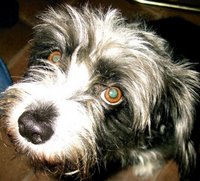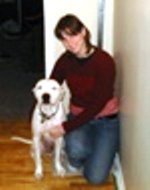What about smaller breeds?
Fear of dangerous dogs, not dangerous breeds
Small dogs are among some of the most feared
Josée Guillemette
 Claudio, mixed terrier
Claudio, mixed terrierWith all this talk about big dogs endangering our children and our letter carriers, has the hostility against small breeds of nipping dogs been forgotten? Or has this city-wide dog watch actually generated a bigger fear of all pooches, big and small?
The public and critics agree that canine enforcement should target all dangerous dogs on a case-by-case basis, rather than only keeping a close eye on pit bulls.
In fact, some fear small dogs more than they do big dogs.
“I definitely don’t think small dogs will ever have to be banned from any city, but I think there should be muzzling laws against small dogs,” said Fay Donnelly, a jogger at West Lions Park. “I find they nip more than, say, a golden retriever. They have nasty little tempers, those things. I stay away from them.”
Donnelly admits that she doesn’t tiptoe around all types of small dogs. She’s only afraid of a few.
“Some are cute, like (pugs), but I never go near poodles or any little terrier,” she said. “Unless you’re their owner, those things are big time bitters.”
Vets concerned with small dogs
Carrie Greenslade, an employee at the Talbot Animal Hospital, said the staff there takes precautions when giving treatment to small dogs, terriers especially.
“We actually muzzle a lot of the small ones before we start any treatment on them," she said. “Any of the terrier breeds have the predisposition to sort of attack because they already have it in them to automatically go after something like a critter.”
Greenslade said the staff protects itself against some of the more temperamental large dogs that come in, but that generally, bigger means tamer.
 “Many of the big dogs are trained because people don’t tolerate a big dog that bites,” she said. “Owners of bigger dogs, most of the time, train them better because they just know they have to.”
“Many of the big dogs are trained because people don’t tolerate a big dog that bites,” she said. “Owners of bigger dogs, most of the time, train them better because they just know they have to.”If only it were that simple – that all owners of big and small dogs felt the responsibility to properly train their pet because they just knew they had to. But alas, this isn’t the case. The suggested pit bull ban is evidence of that.
"It will not stop bites"
Vanessa McMain at the Humane Society’s head office said while a province-wide ban might minimize attacks on humans, it will never completely solve the problem of dangerous dogs. “The problem with this legislation is that it will not stop bites,” said the wildlife program officer from her Toronto office. “It doesn’t consider the implications with other breeds.”
She said the government should start acknowledging that dangerous dogs are not a result of bad genes, but rather bad breeders.
“If your dog is acting in a menacing way, it’s often the fault the breeder,” she said. “They’re breeding dogs, but they’re not breeding a good pet . . . and that’s the case with many popular breeds.”
McMain said popular breeds of dogs are often recognized as the most violent simply because there are more of them.
So, which popular small dogs are statistically more dangerous?
“I have known cocker spaniels to bite,” said McMain. “I saw it when I worked in a hospital, but again, it’s also because they’re a popular breed.”
According to a report issued by the Public Health Agency of Canada, the cocker spaniel - which rarely tops twenty pounds - is second only to the german shepherd in sending children to hospital.
Number of Bites Percent Injuries
German Shepherd - 40 14.4%
Cocker Spaniel - 16 5.8%
Rottweiler - 16 5.8%
Golden Retriever - 15 5.4%
Other - 191 68.7%
Total - 278 100%
Source: CHIRPP Report, July 1997
Michelle Beattie of the Blue Cross Animal Hospital said that the most vicious small dogs - cocker spaniels, chihuahuas and yorkshire terriers - bite because they are poorly trained. She said the main problem is that people who choose a small dog over a big one often do so because they see such ownership as less responsibility.
“The people who buy them often do so because they don’t want to be bothered with the training that goes into having a bigger dog,” she said. “And turns out to be a big problem because the doggie ends up being the dominant member of the house.”
Beattie said these are the kind of spoiled dogs that nip at strangers. “You don’t hear of small dog bites very much because they heal pretty fast, but they do happen quite a bit.”
McMain said that statistics showing severe bites caused by a wide range of breeds should motivate better dog training.
“There needs to be better education for owners because all dogs can bite,” she said. “We would like to see mandatory training.” Such training is available in London.
And she’s not only talking about training for dogs. Owners alike, she said, should undergo training, too.
“You, too, need to be trained in order to learn how to properly train your dog."
Here are some suggestions on what owners can do when their dog is aggressive or needs training.


0 Comments:
Post a Comment
<< Home